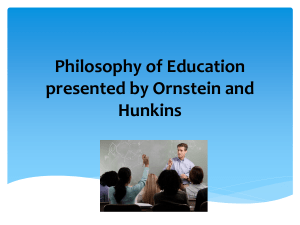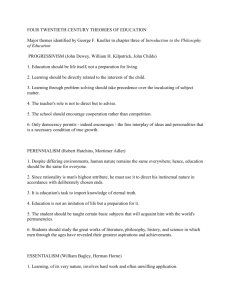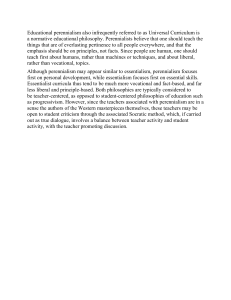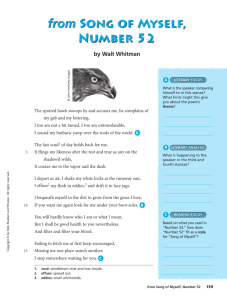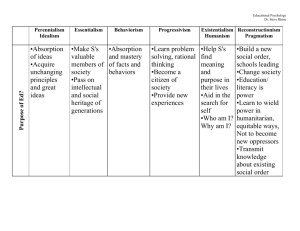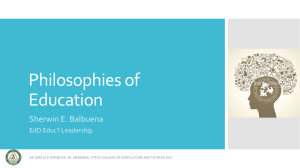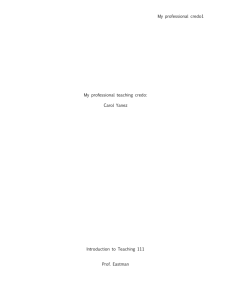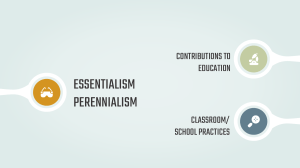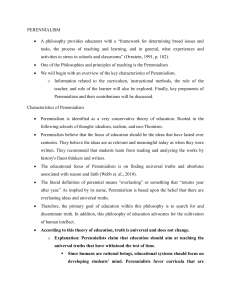Understanding the Self: Philosophical Perspectives Activity
advertisement
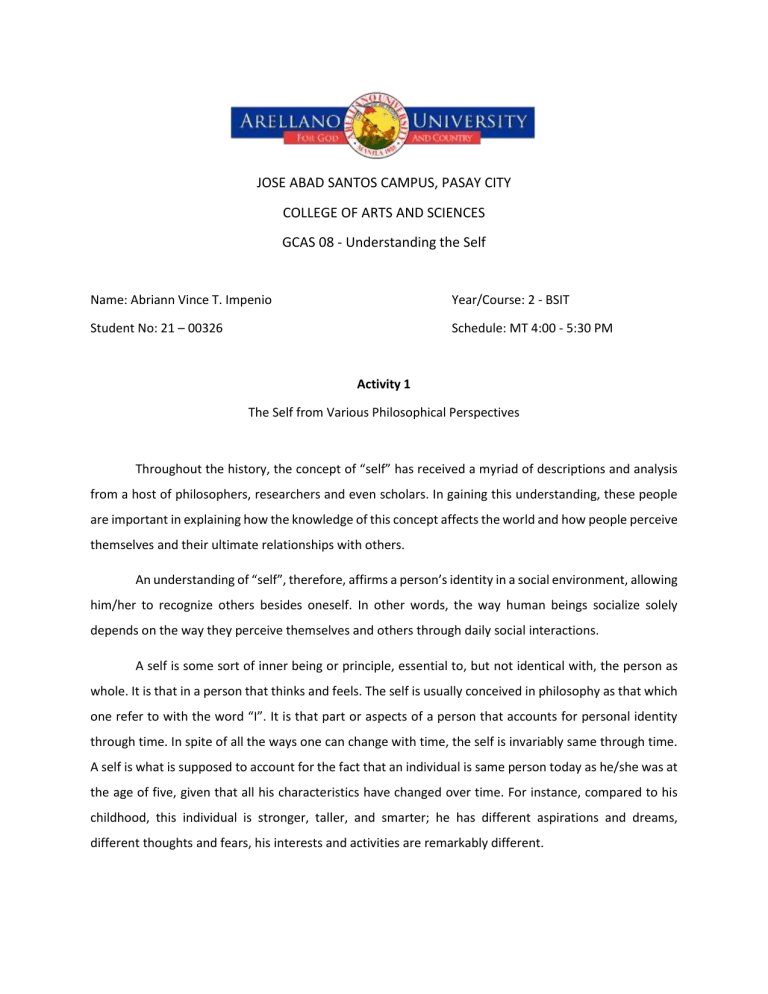
JOSE ABAD SANTOS CAMPUS, PASAY CITY COLLEGE OF ARTS AND SCIENCES GCAS 08 - Understanding the Self Name: Abriann Vince T. Impenio Year/Course: 2 - BSIT Student No: 21 – 00326 Schedule: MT 4:00 - 5:30 PM Activity 1 The Self from Various Philosophical Perspectives Throughout the history, the concept of “self” has received a myriad of descriptions and analysis from a host of philosophers, researchers and even scholars. In gaining this understanding, these people are important in explaining how the knowledge of this concept affects the world and how people perceive themselves and their ultimate relationships with others. An understanding of “self”, therefore, affirms a person’s identity in a social environment, allowing him/her to recognize others besides oneself. In other words, the way human beings socialize solely depends on the way they perceive themselves and others through daily social interactions. A self is some sort of inner being or principle, essential to, but not identical with, the person as whole. It is that in a person that thinks and feels. The self is usually conceived in philosophy as that which one refer to with the word “I”. It is that part or aspects of a person that accounts for personal identity through time. In spite of all the ways one can change with time, the self is invariably same through time. A self is what is supposed to account for the fact that an individual is same person today as he/she was at the age of five, given that all his characteristics have changed over time. For instance, compared to his childhood, this individual is stronger, taller, and smarter; he has different aspirations and dreams, different thoughts and fears, his interests and activities are remarkably different. A. Answer the following: 1. How does Philosophical Perspective understand the self? Self is not just what gives one his personality but also the seat of knowledge acquisition for all human persons. The self-constructs its own reality creating a world that is familiar and predictable. Through our rationality, the self transcends sense experience. It helps one to express what is distinctive of one's view; enhances one's ability to explain difficult material and helps one to eliminate ambiguities and vagueness from one's writing and speech. 2. What are the various philosophical perspectives? Essentialism - Essentialism adheres to a belief that a core set of essential skills must be taught to all students. Essentialists tend to privilege traditional academic disciplines that will develop prescribed skills and objectives in different content areas as well as develop a common culture. Typically, essentialism argues for a back-to-basics approach on teaching intellectual and moral standards. Perennialism - Perennialism advocates for seeking, teaching, and learning universal truths that span across historical time periods. These truths, Perennialists argue, have everlasting importance in helping humans solve problems regardless of time and place. While Perennialism resembles essentialism at first glance, perennialism focuses on the individual development of the student rather than emphasizing skills. Perennialism supports liberal arts curricula that helps produces well-rounded individuals with some knowledge across the arts and sciences. Progressivism - Progressivism focuses its educational stance toward experiential learning with a focus on developing the whole child. Students learn by doing rather than being lectured to by teachers. Curriculum is usually integrated across contents instead of siloed into different disciplines. Progressivism follows a clear pragmatic ontology where the learner focuses on solving real-world problems through real experiences. Social Reconstructionism & Critical Pedagogy - Social reconstructionism was founded as a response to the atrocities of World War II and the Holocaust to assuage human cruelty. Social reform in response to helping prepare students to make a better world through instilling democratic values. Critical pedagogy is the application of critical theory to education. Critical pedagogy’s goal is to emancipate marginalized or oppressed groups by developing, according to Paulo Freire, conscientização, or critical consciousness in students. 3. What is self according to Descartes? Descartes' idea was that the self isn't a material thing like the physical body, but something immaterial and non-physical. In the Meditations and related texts from the early 1640s, Descartes argues that the self can be correctly considered as either a mind or a human being, and that the self’s properties vary accordingly. For example, the self is simple considered as a mind, whereas the self is composite considered as a human being. B. Answer the following questions about yourself as honestly and precisely as you can. 1. How would you characterize yourself? If I were to characterize myself, I am a shy type of person but once I get to get along with other people well, that would minimize my shyness. Seeing myself grow, there have been many changes about me as I continue to grow older that also change the way of how I see things on what a real life is. Therefore, it becomes clear to me that as I grow older there will be changes about my personality and must overcome my weaknesses and never set standards of what I want to. The character that I built when I was still a child would continuously change and I've learned that only you can control and define your own character, attitude, and behavior. 2. What make you stand out from the rest? What yourself special? I continue to know myself more and be confident on what I am capable. There’s nothing special in me but rather I think that I have potential. Being confident is the most troublesome thing that I hate about myself but as I continue to learn from my experiences, I can overcome that obstacle and be the person who I usually want to be. When you truly believe you can achieve your goals and are not afraid of the challenges, your confidence will automatically set you apart from the crowd. Character Development is important for me, and the progress that I do from my experiences will help me grow better as a person. 3. How has your self-transformed itself? Learning from my past mistakes. We humans are not perfect, we all make mistakes. Seeing as myself learning continuously I also learn about the things that I’ve made in the past will not usually make me happy. Not only did I learn the right response to life's problems, but I also learned patience and how to accept that we do not always succeed in life and get what we want and expect, but that we still need to live with faith and grace so that the next time we can perform better. 4. How is your self connected to your body? Without a doubt, there are mental, emotional, spiritual, and physical ties that bind me to my body. To function properly, I think these parts of the body must be linked to one another. My emotions reflected based on my behavior. Therefore, I must be aware of the things that my mind is thinking before doing it. For example, when we get angry most people say or do negative things. It depends on the people’s emotion when we are happy, sad, etc. the things that we think on our mind will reflect on what will people do. 5. How is your self related to other selves? In relation to others, I have to say that some people are open and some are not. It depends on the people what I usually hang out with. Based on my experience, there are cases where when I talk to a serious person or people, I also talk the same way to them especially when I’m not close with that person, I hate seeing myself or having them to think that I am weird when I usually show my true personality, and that’s the reason why I am not really a talkative person if I’m not that comfortable with that certain person. When both sides are open, we have a tendency to connect, and that connection would be successful. The other would attempt to fend off any effects that others might have on his or her system, which could lead to chaos, if the other were not open. 6. What will happen to yourself after you die? Based on my knowledge, in a spiritual way as many people say my soul will be separated from my body. Even though my body dies my spirit will linger on. There is nothing that science can explain when we die so people must rather accept the fact what is written on the bible. 7. What is your philosophy in life? You should do what you want with your life, as long as it makes you happy and causes no harm to others. Having what we do we want on our lives especially when we have a job is the best achievement that we could hope for. As long as it makes me happy and contented with the things that I want in my life I will not ask for more but rather help people in needs and that’s better than causing harm or degrading others when I achieve my goals. C. Listen to the song “SINO AKO” by Jamie Rivera (https://www.youtube.com/watch?v=cDktncQuQrU) Make a short reflection about the song. The song “Sino Ako” actually reflects to who I am since I was born and shows how thankful we are for our God-savior. As we sing this song, it also conveys a message of prayer and fills our hearts with God’s holy presence. As I listen to this, it is very relaxing and helps to relieve stress whenever we are having a hard time in our lives and this song is also good for meditation as we sleep and listen to this. Moreover, if we listen to the song carefully it mostly talks about God and wants us to deliver a message about how much our God loves us and wants us to love one another.
